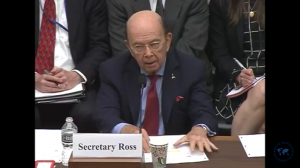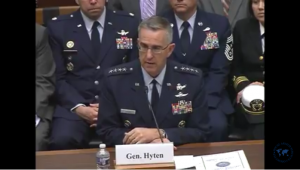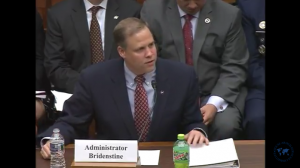On the morning of Friday, June 22nd, a joint hearing of the House Subcommittee on Strategic Forces and the House Subcommittee on Space was convened to discuss the responsibilities of various U.S. government agencies on space situational awareness (SSA) and space traffic management (STM) efforts. The hearing occurred just days after the administration of President Donald J. Trump issued Space Policy Directive-3 (SPD-3) to set a new national space policy to address issues related to both SSA and STM including tracking the existence of space debris, encourage commercial activities in space and improve the national security of the United States in a world where foreign powers are increasing their presence in space.
SPD-3 addresses new approaches to STM that the Trump Administration argues are necessary to handle current and future operational risks posed by the growing number of space objects. Along with maintaining an international lead in STM data sharing, the policy sets priorities for SSA as well as science and technology goals for more effective STM that will incorporate both national security considerations and encourage growth of the burgeoning commercial space sector. Under the new space policy, members of the National Space Council are responsible for advancing research related to both SSA and STM; the administrator of the National Aeronautics and Space Administration (NASA) will lead orbital debris mitigation efforts; and the Department of Commerce will take the lead on efforts to facilitate U.S. commercial leadership in SSA and STM.
Making up the witness panel for this hearing were the three administrators which will be responsible for implementing the goals of SDP-3: General John Hyten, the commander of U.S. Strategic Command within the Department of Defense (DoD); Jim Bridenstine, the recently appointed administrator of NASA; and Wilbur Ross, the secretary of the Department of Commerce, the civil agency given the responsibility of facilitating the vast majority of the interagency goals of SPD-3.
Serving as the chairman for the day’s joint subcommittee hearing was Congressman Mike Rogers (R-AL), who noted that STM would become more crucial in the coming years given the growing number of objects orbiting Earth at some level in space. This included 620,000 known pieces of space debris as well as the addition of thousands of satellites in the years to come from commercial entities like Boeing or SpaceX. NASA Administrator Bridenstine acknowledged the seriousness of this issue given the effects of the 2009 satellite collision between two artificial satellites on the space debris field, a situation which could become more likely with increased satellite launches in the years to come.
General Hyten noted that with the Commerce Department taking the lead of the civil SSA program to provide data to commercial and international partners, it allows the DoD to focus more on its mission to improve national security by preventing threats from space. Hyten, who was the investigating officer on the 2009 satellite collision, spoke to the resources the DoD had contributed to space safety initiatives which weren’t necessarily within the mission of the DoD. “We came to the realization that we’re going to have to do this flight safety mission ourselves,” Hyten said. “We had to take about 100 airmen, 100 military people, off of other missions and put them on that in order to do that mission.” Moving SSA safety initiatives into the domain of the Commerce Department thus frees up airmen for DoD air fighting missions, Hyten said.
Congressman Lamar Smith (R-TX) asked Commerce Secretary Ross why, in addition to SSA oversight, is the Commerce Department the best agency to oversee STM as well. Secretary Ross answered that many of the agencies involved in space activities are located within the Commerce Department and have been working to reduce bureaucratic inefficiencies in light of SPD-3 and other space policy directives signed by President Trump. These agencies include the International Trade Administration (ITA), the National Institute of Standards and Technology (NIST), the National Telecommunications and Information Administration (NTIA) and the National Oceanic and Atmospheric Administration (NOAA), the latter of which oversees the largest operational space force in the civilian sector. Elsewhere, Secretary Ross noted that the Commerce Department is already obliged to encourage growth in the space sector through the Office of Space Commerce, making Commerce’s lead in civilian space operations under SPD-3 “quite logical.”
One of the policy changes put into effect by SPD-3 is the responsibility for publishing a catalog of known space objects which will move from the DoD to the control of the Commerce Department; this catalog is important for STM purposes to notify of potential collisions of space objects. Although the DoD will continue to track space object data to catalog data important for national security purposes, the agency will feed publicly available information to the Commerce Department which is intended to be provided to commercial and international partners for free. As Administrator Bridenstine noted during the hearing, this free access to SSA space object data should encourage a more competitive space market within the U.S. among companies who want to take data made available by the Commerce Department to augment with their own space tracking abilities, increasing investment in U.S.-based space ventures and potentially driving down insurance prices relative to the rest of the world.
Under SPD-3, NASA will continue to have a large role in developing science and technology related to SSA and STM. General Hyten said that, while the DoD has many capabilities within its own agency, it would continue to incorporate algorithms and other technologies developed by NASA into its space object tracking missions. Administrator Bridenstine said that NASA would continue to make investments into data processing technologies which would improve the safety of space environments for those entities operating in space. Bridenstine also spoke to the potential of robotic servicing of satellites in orbit to increase their service life and reduce the need for sending replacement satellites into orbit. NASA investments in robotics could also potentially be geared towards remediation of space junk to remove objects from space, although Bridenstine said that robotic operations would ideally be performed by commercial entities licensing technology from NASA.
U.S. action on SSA and STM is becoming necessary to maintain space dominance in a world where other foreign powers have been increasing their space capabilities. General Hyten spoke to the activities of both the Russian and Chinese governments that have been making major investments from their national treasuries into space capabilities which he said have been for the express purpose of countering U.S. advantages in space. “It’s not for something going on in the Western Pacific,” Hyten said. “As the commander responsible for defending the nation in that domain, I have to look at those capabilities as real threats and that means I have to develop counters to those threats.” This requires exquisite situational awareness in the space domain to counter those threats, Hyten said.
Throughout the hearing, the trio of Hyten, Bridenstine and Ross seemed to be in agreement that the President’s new space policy was an effective step forward for the United States both in terms of national security and commercial dominance of space. Although Bridenstine, while a member of Congress, had previously introduced the American Space Renaissance Act that would have put commercial activity efforts within the authority of the Federal Aviation Administration (FAA), he said his views had shifted and he believed the Commerce Department was well situated to handle these tasks instead. “It appears now that the right course of action, given the consensus that has been come to, is that it be at Commerce, and I fully support that,” Bridenstine said. “The key is that it needs to be done, it needs to happen.”

![[IPWatchdog Logo]](https://ipwatchdog.com/wp-content/themes/IPWatchdog%20-%202023/assets/images/temp/logo-small@2x.png)


![[[Advertisement]]](https://ipwatchdog.com/wp-content/uploads/2023/01/2021-Patent-Practice-on-Demand-1.png)


![[Advertisement]](https://ipwatchdog.com/wp-content/uploads/2024/04/Patent-Litigation-Masters-2024-sidebar-early-bird-ends-Apr-21-last-chance-700x500-1.jpg)

![[Advertisement]](https://ipwatchdog.com/wp-content/uploads/2021/12/WEBINAR-336-x-280-px.png)
![[Advertisement]](https://ipwatchdog.com/wp-content/uploads/2021/12/2021-Patent-Practice-on-Demand-recorded-Feb-2021-336-x-280.jpg)
![[Advertisement]](https://ipwatchdog.com/wp-content/uploads/2021/12/Ad-4-The-Invent-Patent-System™.png)







Join the Discussion
One comment so far.
Benny
July 2, 2018 06:50 am“The exploration and use of outer space, including the moon and other celestial bodies, shall be carried out for the benefit and in the interests of all countries, irrespective of their degree of economic or scientific development, and shall be the province of all mankind.” (UN treaty, signed by the US in 1967)
That doesn’t square with General John Hyten’s remarks.